SEDL Letter Archive
SEDL Letter was SEDL’s institutional magazine from 1995 through 2010 and covered issues of teaching, learning, and policy as they affect K–12 education. SEDL Letter examined issues that affect schools and districts today: teaching, reading, hiring and supporting quality teachers, and improving student achievement. The mix of articles varied with each issue but usually covered national and regional trends, research findings, and promising practices. Other features included essays from classroom teachers and instructional activities for use in the classroom. The magazine was titled SEDLetter from 1995 through 2002.
2000–2010
The list of SEDL Letter editions below is arranged in reverse chronological order. You can use the menu on the right to browse articles by subject.
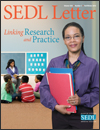 |
Linking Research and Practice New challenges and opportunities in the area of research use have prompted us to explore how practitioners use research and evidence to inform their work. This issue of SEDL Letter examines what researchers themselves have learned about the use of education research over the past several years, how the use of data is shaping instruction, and knowledge translation in the Disability Research to Practice program. We also provide an interview with the Institute of Education Sciences' communications director, Tracy Dell'Angela. |
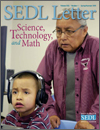 |
Science, Technology, and Math In this issue of SEDL Letter, we address challenges and solutions related to science, technology, engineering, and Math (STEM) instruction. We describe three different professional development projects, examine the importance of evaluation, and review a research report on ways that instructors can engage students, especially those who are underrepresented in STEM fields. |
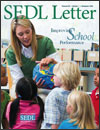 |
Improving School Performance School improvement isn't just about schools. It's also about students and teachers, and how education leaders at all levels—state, district, school, and classroom—work together to help students succeed. This issue of SEDL Letter explores school improvement in a variety of areas. A PDF version is also available. |
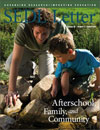 |
Afterschool, Family, and Community This issue of SEDL Letter is devoted to afterschool and family and community involvement. We focus on the research, presenting a summary of two systematic reviews and a summary of a research synthesis on afterschool programs. In this issue, we have included an article about the Parental Information & Resource Centers (PIRCs) program. Two other articles feature examples of how family members and community organizations work with schools. Finally, a national homework expert, discusses recent research and how homework supports student learning. A PDF version is also available. |
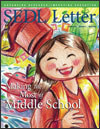 |
Making the Most of Middle School This issue of SEDL Letter examines some of the issues middle school educators face, including the lack of national policy addressing these years. We learn from a former middle school principal how families can help their middle school students. We look at the research that shows how middle schoolers are falling behind in math. We debate whether we should revamp middle schools and go back to the K-8 system. Finally, we discuss how afterschool programs can attract and retain this hard-to-reach audience. A PDF version is also available. |
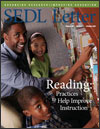 |
Reading: Practices to Help Improve Instruction This issue of SEDL Letter examines study groups, organizing the classroom for effective reading instruction, strengthening literacy through father-child interactions, systemic approaches to reading and school improvement, and a national art contest sponsored by SEDL for children ages 5-18 enrolled in K-12 studies. A PDF version is also available. |
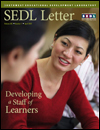 |
Developing
a Staff of Learners This issue of SEDL Letter examines various forms of on-the-job professional development as well as standards of effective professional development. A PDF version is also available. |
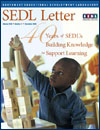 |
40
Years of SEDL's Building Knowledge to Support Learning This issue of SEDL Letter celebrates SEDL's history and touches upon new work. A PDF version is also available. |
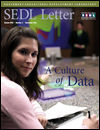 |
A
Culture of Data Building a culture of quality data means administrators, teachers, and other staff members must have access to the data they need and must know how to analyze the data and use it to make instructional decisions. The current issue of SEDL Letter examines these issues. It looks at a recent research study about state data and discusses how school staffs can take the first steps in learning to analyze data effectively. |
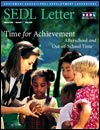 |
Time
for Achievement: Afterschool and Out-of-School Time Afterschool and out-of-school programs across the country are providing students with more than a place to hang out after school. Read about promising practices and new research findings related to afterschool programs. A PDF version is also available. |
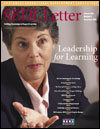 |
Leadership for Learning This issue of SEDL Letter discusses strategies
that can help education leaders A PDF version is also available. |
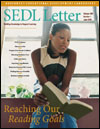 |
Reaching Our Reading Goals This issue of SEDL Letter is devoted to topics related to reading instruction, including the role of literacy coaches, motivating readers, and instruction to improve comprehension.
A PDF version is also available. |
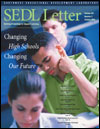 |
Changing
High Schools Changing Our Future This issue of SEDL Letter explores how high schools are creating new learning environments to better meet the needs of a changing student population. We learn about practical ways schools can improve achievement and visit Irving ISD to find out how smaller learning communities enrich learning. We also discuss SEDL’s Active Learning with Technology, Teachers as Leaders professional development, and work in school safety. |
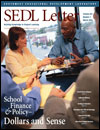
|
School
Finance and Policy: Dollars and Sense This issue of SEDL Letter examines a variety of finance issues that policymakers and administrators may face-resource allocation, school finance adequacy, and efficiency. We also examine how technology planning can help meet the needs of all students and hear from a parent how well-defined, fairly implemented discipline policy is for the good of administrators, teachers, parents, and students. |
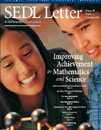 |
Improving
Achievement In Mathematics and Science This issue of SEDL Letter examines issues related to improving math and science achievement, including how the No Child Left Behind Act affects math and science instruction and the importance of providing children with a foundation in algebraic thinking well before high school. A PDF version is also available. |
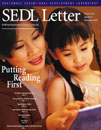 |
Putting Reading First In this edition of SEDL Letter, you will learn about some of the issues related to Reading First like myths of reading instruction and phoneme awareness and also learn about resources to help struggling secondary readers. There are also some activities In this edition for teachers to use in their classrooms. A PDF version is also available.
|
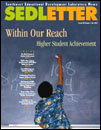 |
Within
Our Reach: Higher Student Achievement In this edition of SEDLetter, you'll read about the factors that contribute to increased student learning and achievement, including the reauthorization of the Elementary and Secondary Education Act, or No Child Left Behind. A PDF version is also available. |
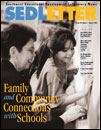 |
Family
and Community Connections with Schools In this edition of SEDLetter, you'll read about family and community connections with schools, school-based mentoring, charter schools, and teacher education programs. A PDF version is also available. |
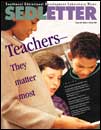 |
Teachers
- They matter most In this edition of SEDLetter, you'll read about teacher quality, alternative certification programs, a successful permanent substitute program, and a teacher mentoring initiative in Arkansas. A PDF version is also available. |
 |
Changes
and Challenges for Rural Schools In this edition of SEDLetter, read about rural schools striving to overcome their many challenges—including low budgets, increasing social problems and pressures, and isolation—to provide the best education possible for their children and teens. A PDF version is also available. |
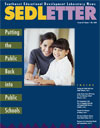 |
Putting the Public back
into Public Schools This edition of SEDL Letter looks at ways in which
we can involve the public and ways in which citizens have
made a difference in their communities and schools through
SEDL field-based research projects. A PDF version is also available. |
1995–1999
At the Heart of the Matter: Improving Teaching and
Learning Through Professional Development
August 1999, Volume XI, Number 2 (A PDF version is also available.)
Unlocking the Future: Early
Literacy
March 1999, Volume XI, Number 1
Building for
Learning
September 1998, Volume X, Number 4
Pulling Together
April 1998, Volume X, Number 3
New Policies
for Southwestern Schools
December 1997, Volume X, Number 2
Technology
Comes to School
November 1996, Volume IX, Number 4
Constructivism
August 1996, Volume IX, Number 3
School Safety
August 1995, Volume VIII, Number 2

 This edition of SEDL Letter won the Platinum award in the 2005 MarCom Creative Awards. The award honors excellence and recognizes the creativity and hard work of marketing and communication professionals.
This edition of SEDL Letter won the Platinum award in the 2005 MarCom Creative Awards. The award honors excellence and recognizes the creativity and hard work of marketing and communication professionals.